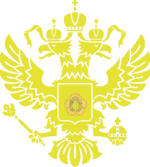Government of Svetvostok
 Emblem of the Government of the Republic of Svetvostok | |
| Jurisdiction | |
|---|---|
| Legislative branch | |
| Legislature | State Duma |
| Meeting place | State Duma Building |
| Executive branch | |
| Leader | President of Svetvostok |
| Headquarters | Krasnaya Grad |
| Departments | 19 |
Legislative branch
The legislature of Svetvostok is called the State Duma. Duma's influence and authority have continuously increased since the military regime. The existing Duma had only the authority to submit bills and amend the Constitution, and the Duma had only the authority to submit bills during the military regime. However, after the collapse of the military regime, Duma's authority increased significantly. Also, to prevent the executive branch from overrunning its power, the executive branch cannot disband Duma. However, at the same time, this resulted in the absence of institutional mechanisms to keep Duma in check.
Executive branch
The administration is composed of 19 departments centered on the president. The president has diplomatic authority, executive authority, and military authority as the head of the administration and the constitutional leader of Svetvostok. The president has a four-year term and can be re-elected once. The secretary of each department is appointed by the president and has a two-year term.
Current members of the administration
| Position | Photo | Name | Born date | Nominated by |
|---|---|---|---|---|
| President of Svetvostok | President Han Yeji |
February 12th, 1997 | - | |
| Vice President of Svetvostok | Vice President Nikita Sobolov |
August 20th, 1989 | Han Yeji |
Judicial branch
The judiciary is composed of the district court, the high court, the supreme court, and the constitutional court. The district court, the high court, and the supreme court are in charge of general civil and criminal trials, and the constitutional court is in charge of reviewing the dismissal of public officials, examining whether laws are unconstitutional, and resolving disputes among government agencies.

